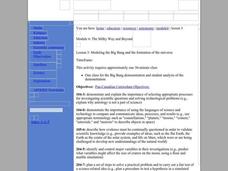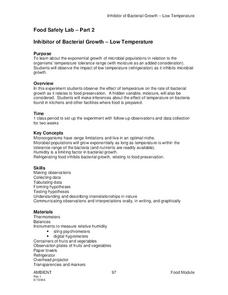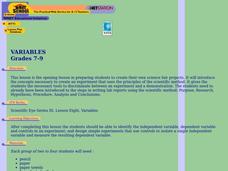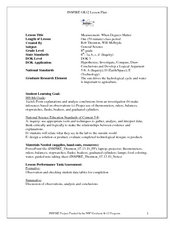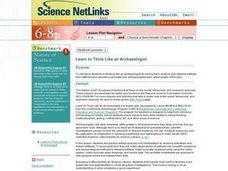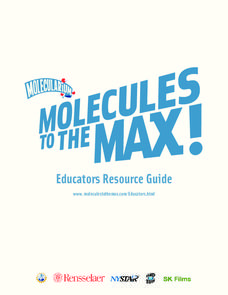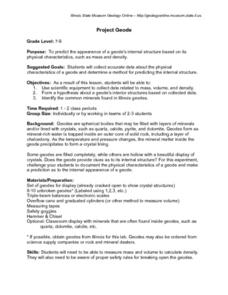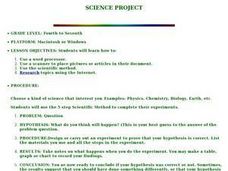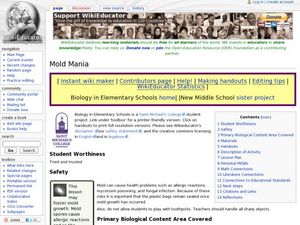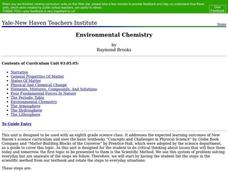Curated OER
Observing Reactions
Students use the scientific method to complete to experiments that have visible reactions. In this visible reaction instructional activity, students participate in an experiment with melting ice and one with inflating a balloon. Students...
Curated OER
The Big Bang Theory
Students will use scientific reasoning to formulate ideas about the formation of the universe using the Big Bang Theory. The use of critical thinking skills is part of the activity and the foundation of the scientific method will serve...
Curated OER
Food Safety Lab
Students use the scientific method to investigate the role of temperature in microbial growth. In this food preservation instructional activity, students set up an experiment with fruit in room temperature and in a refrigerator. They...
Curated OER
Robert Boyle and Experimental Methods
Students discuss the difference between the Baconian inductive method and the Aristotelian deductive approaches. They complete a given set of questions then discuss them with the class.
Curated OER
Variables
Students watch a video show how to identify the independent variable, dependent variable and controls in an experiment; and design experiments that use controls to isolate a single independent variable and measure the resulting dependent...
Curated OER
Measurement: When Degrees Matter
Eighth graders record the temperature change of the beakers. In this general science lesson, 8th graders create their own data table for recording observations. They discuss experimental results and cite real life applications.
Curated OER
Creating a Salad Dressing
Students investigate how the scientific process can be applied to making a new salad dressing recipe.
Curated OER
Leaarn to Think Like an Archaeologist
Students examine how to act as archaeologists by examining artifacts. The inquiry is meant to teach learners about analysis of ancient civilizations and scientific finds. Fossil evidence is also covered to make connection to the...
Rensselaer Polytechnic Institute
Molecules to the Max!—Educators Resource Guide
From molecules to nanotubes, an engaging unit explores the world of tiny science. Fifteen hands-on experiments and lessons engage young scientists as they learn chemistry. Discussions, worksheets, and data analysis reinforce the concepts...
Curated OER
Communication in Bees
Eighth graders identify and interpret a scientific investigation and a hypothesis through experimentation and testing a hypothesis. They identify what scientists hypothesized about the communication of stingless bees. Finally, 8th...
Curated OER
Earth's Hydrologic Cycle
Learners examine the water cycle. In this hydrologic cycle lesson plan, students follow the provided procedures to demonstrate the how water moves around the planet through the dynamics of the water cycle.
Curated OER
Project Geode
Young geologists attempt to predict the appearnace of a geode's internal structure based on how it looks from the outside, its mass, and its physical characteristics. For this geologly lesson, learners use scientific equipment to collect...
University of North Carolina
Psychology
Psychology, the scientific study of the human mind and behavior, is a popular major for many college students. An informative handout outlines common assignments in psychology courses. Scholars see how to design a research proposal,...
Curated OER
Wind Power
What a wonderful way to explore wind power! Through this lesson, learners get a background in the history of wind power, create their own wind turbine, and the test their designs. This is a terrific way to tie scientific principles to...
Curated OER
Woodwind Instruments and Pitch
Students explore musical pitch. In this cross curriculum musical instruments and "sound" physics instructional activity, students identify and describe common traits of woodwind instruments. Students research "pitch" and what causes...
Curated OER
Separation of a Complex Mixture
Young scholars develop a method to separate different types of mixtures. In this chemistry lesson, students model the steps in the scientific method. They perform the experiment and analyze data.
Curated OER
Science Project
Pupils research a topic in the various fields of science that interests them. Using a computer, they type their information to use on their project and use a scanner to place pictures or articles in the document. They use the steps...
Curated OER
About Science
Students explain why physics is the basic science. They outline scientific methods by distinguishing among observations, facts, hypotheses, laws, and principles. Students describe the circumstances under which a hypothesis or law must be...
Curated OER
Determining the Geologic History of Rocks from a Gravel Deposit
Students apply the scientific method to identify rocks from glacial deposits, hypothesize how they got there and then test their hypothesis. They are given the experience of active, hands-on inquiry.
Curated OER
Primary Biological Content Area Covered
Students use the scientific method to make predictions about mold growth. In this fungus lesson, students use worksheets to help them illustrate predictions and graph mold growth from white to wheat bread. Students first...
Curated OER
Integration, the Skill that Binds
Tenth graders use mathematical concepts to help clarify their beliefs, effect solutions, and improve verbal skills. They use the steps common to the scientific methods as an aid in development of cognitive skills.
Curated OER
Environmental Chemistry
Eighth graders are introduced to the topic of Environmental Chemistry. In groups, they review the steps within the scientific method and develop their own hypothesis and design an experiment. They solve equations related to the...
Curated OER
Crazy for Cubes: Art and Science
Learners discuss Sol LeWitt and conceptual art, then analyze the differences in expressing a concept through model-based inquiry and aesthetic art criticism. They develop a geometric, scientific, or mathematical concept, then create an...
Curated OER
Ice Melting
Students design investigations to test various materials to prevent heat gain in frozen water. The task assess students' knowledge of scientific inquiry including the following skills: observation, data collection, measurement,...



